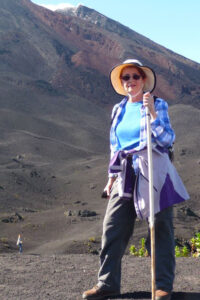During our 25th Anniversary celebration, we are introducing you to the dedicated volunteers who work tirelessly to promote greater access to education. This month we meet Julia, a former public servant and current Director on ACCESO’s Board. Julia became a volunteer with ACCESO after seeing first-hand the positive impact of schooling on the lives of marginalized children in Guatemala.
I fulfilled a dream after I retired in 2014 by going to Guatemala for a month, teaching English in an elementary school in the mountain village of Santa María de Jesús. I found the people of Guatemala to be wonderful (I have visited the country again and will continue to go back). I was shocked, though, by the struggle for basic existence for many of these brave people, and for the immense difficulties facing many of the country’s children in particular. Undernourishment is a major factor of life in Guatemala, and all too many survive on one meal a day. I saw children at work on the street and in the marketplace, making tortillas or selling gum and candy from a tray often hung around their necks. Young boys would lug shoeshining equipment around the streets, in competition with each other for the rare customers.
In the mountain village where the school is located, many of the families speak the local Indigenous language, passed down orally over generations, yet often lack in Spanish literacy skills which are deemed essential to access socio-economic opportunities. The government-provided elementary school is out of reach for many of them. School supplies must be provided by the family, and children’s labour is required to contribute to the family’s meager income. Many families have no members who have ever gone to school.
The school I worked in was supported solely through charitable funding. There was no playground or even running water, and just a small whiteboard in the classroom. The principal worked with village families to encourage them to send their children to make a better life possible. Children were welcomed even beyond the normal school starting age of 7 years, with some of them starting school at 11 or 12. The skills and dedication of the teachers dealing with the resulting classes of mixed levels amazed me. Each teacher taught two groups a day, one from early morning until noon, then another all afternoon, with only a short break between. The teachers had less vacation than in the public schools, as a longer school year was necessary for the students to catch up and graduate. The school provided support for parents, all school supplies, and a hot snack mid-morning/afternoon. The principal also worked hard to line up the funding required for students to carry on to the next level of education, and in some cases, transportation and food. The school empowered these children for a brighter future, one inaccessible to those who have to work during school hours. I saw the evidence when I met student teachers who had been students in that school themselves.
When I returned to Ottawa I got involved with ACCESO, first enjoying the Sounds & Tastes event, and ultimately becoming a volunteer. I saw for myself that the projects ACCESO supports are exactly what is needed to assist marginalized children such as the students I met at that school. The relatively low (to us) cost of tuition and other expenses is an insurmountable barrier to them. The bursaries that ACCESO provides make all the difference and enable students to reach for a better future for themselves, their families and communities. ACCESO’s support to preschools and elementary schools is particularly close to my heart, given their importance to students’ literacy in preparation for government schools.
The transformative power of education I saw in Guatemala and the striving of impoverished families and children for a better life have inspired me to contribute to ACCESO’s work in Latin America and Canada. It has been making a difference for 25 years.
Julia




